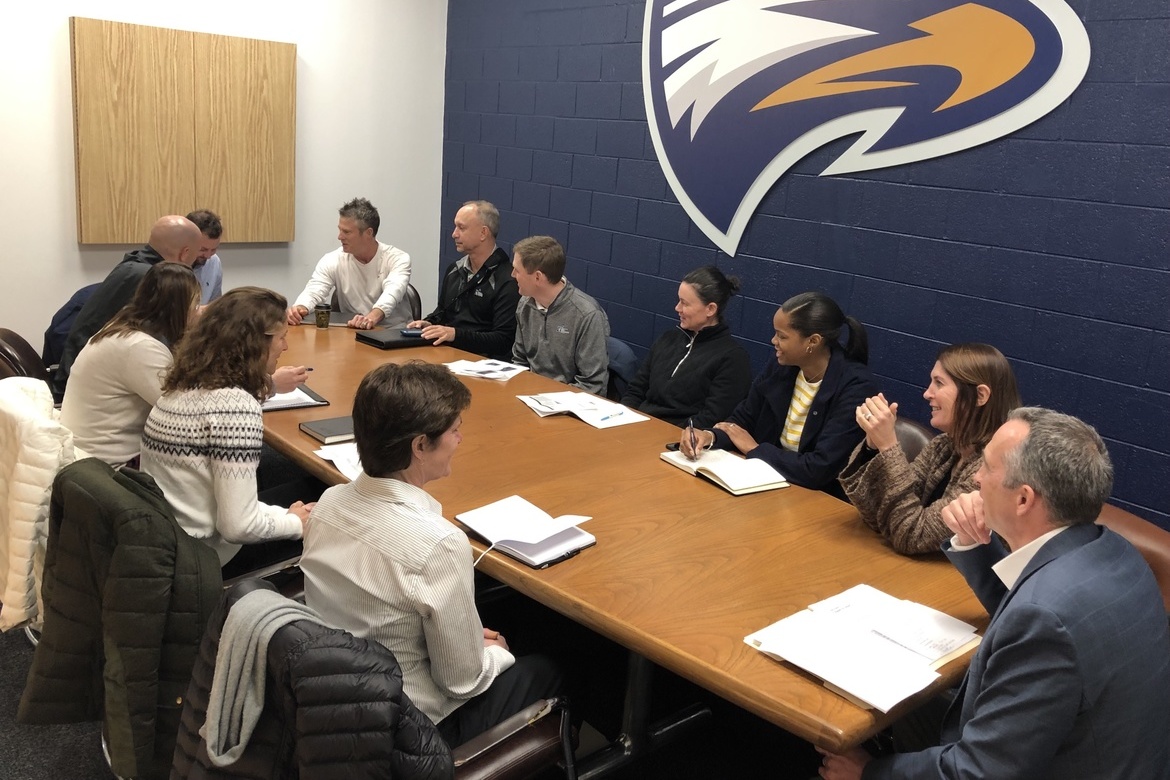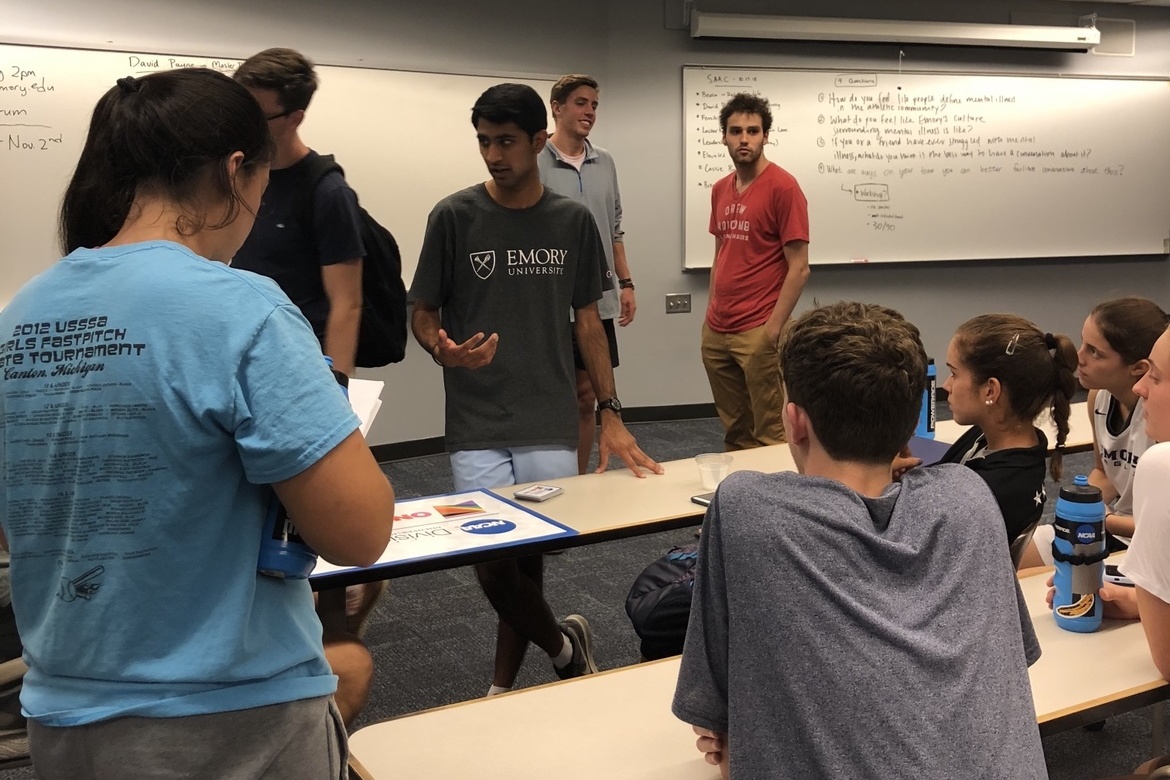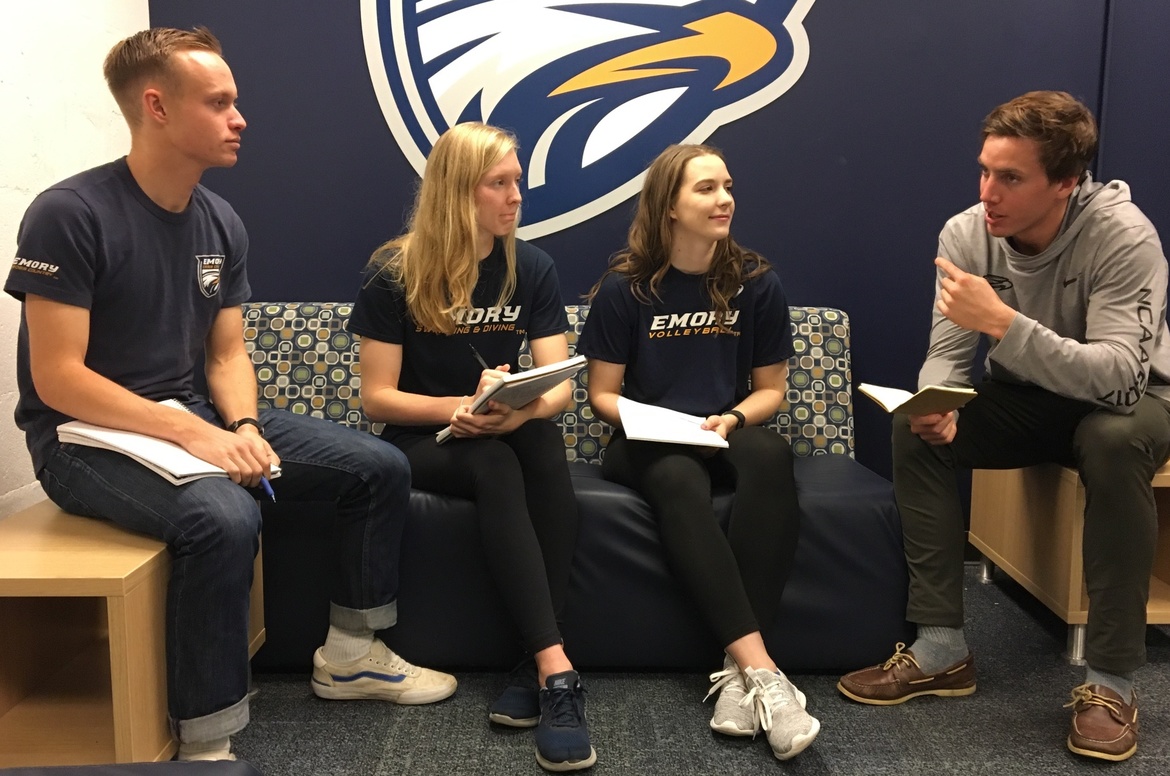
January 22, 2019
Emory Athletics develops unique approach to nurturing good character
By S.A. Reid, Consulting Writer, Campus Life
Emory’s 25 NCAA Division III national championship titles,195 University Athletic Association (UAA) team championships, 989 All Americans, and 113 NCAA Postgraduate Scholars are proof that the university’s student athletes know how to win on the field and in the classroom.
Now, they are learning that – according to the Emory Athletics Integrity Initiative – the “I” in win stands for “integrity.”
That’s the message the Athletics Department is working to instill in the university’s more than 400 student athletes through this special program that encourages good character on and off the field.
 In coaches' meetings, staff explore topics for Emory Athletics Integrity Initiative.
In coaches' meetings, staff explore topics for Emory Athletics Integrity Initiative.
Photo courtesy of Emory Athletics.
The Emory Athletics Integrity Initiative and its social media hashtag #flyhigher reflect a new culture and definition of success based on ethical standards that more formally emphasize the importance of integrity and doing things the right way – while also engaging coaches and staff.
The initiative is the brainchild of Women’s Tennis Coach Amy Bryant who came up with the idea out of concern about the proliferation of highly publicized scandals involving student athletes at peer institutions around the nation. Public controversies over misogynistic “locker room talk” was an additional motivation.
"I thought it would be unique to publicly focus on the integrity we practice at Emory instead of simply wins and losses,” said Bryant. “Additionally, with the help of colleagues, I created programming to educate staff and student-athletes about susceptible areas for negative press coverage while providing guidance on ethically navigating difficult athletics scenarios."
The initiative is a signature program of the Emory Integrity Project (EIP), a campus-wide effort to cultivate a culture of honor, humility, and helpfulness.
Through its programming, the initiative provides opportunities for student athletes across all varsity sports and their coaches to pause for ethical reflection and practice principled action.
A signature activity is the Athletics Integrity Initiative’s own version of “Locker Room Talks,” which are held during the meetings of head coaches and the Student Athlete Advisory Committee. The talks provide a safe space for student athletes and coaches to have separate group discussions on a variety of topics of interest.
Recent topics of the monthly meetings, which include representatives from each of the university’s 19 varsity sports teams, range from mental health support and sexual assault to hazing prevention and e-sports.
According to seniors Matt Rogers and Fiona Muir, seniors who co-chair the board of the advisory committee, the talks help student athletes to be more open-minded and understanding of other people’s views.
 Student Athlete Advisory Committee members represent all 19 teams of the Emory Eagles athletics program. Photo courtesy of Emory Athletics.
Student Athlete Advisory Committee members represent all 19 teams of the Emory Eagles athletics program. Photo courtesy of Emory Athletics.
“Locker Room Talks have been an awesome addition to our meeting agenda. They allow our student-athletes to voice their thoughts on controversial topics in sports,” said Rogers, a member of the swim team and a business major. “Student athletes get to hear a diverse set of viewpoints from their peers, whose voices carry a lot of weight in our community.”
Muir agrees. “Creating a space where open dialog is normal and even encouraged, is what makes the Locker Room Talks so valuable in the moment as well as when the student athletes go out and are a part of their sports teams, the Emory campus, and the community,” added the swim team member and neuroscience major.
The coaching staff has explored a myriad of topics from best practices for managing complex team situations to federal, state, and university equity and inclusion policies, according to Women’s Volleyball Head Coach Jenny McDowell.
“Our conversations are not always comfortable but, in the end, we all learn something new,” McDowell said.
Another hallmark activity is the leadership training offered through the Eagles Rising Leadership Workshop. As many as 100 student athletes have participated in fall or spring workshops designed to build their capacity for leadership, communication, and promoting a positive team culture based on the tenets of ethical leadership, moral courage, and values-based decision making.
A key message from the workshops is that everyone is responsible for integrity and leadership, according to Audrey Hester, assistant athletic director for Student Athlete Success and Compliance.
“Anybody can be a leader,” said Hester, who coordinates the workshop series. “You don’t have to be a senior or team captain. It’s up to the person to step up in different situations.”
Some student athletes who exemplify integrity, leadership, and other attributes that define good character and ethical decision making in their respective sport have reaped rewards through another signature element of the initiative – the Elevated Eagle Award.
 Student athletes, from left: Bennett Shaw 19C, Fiona Muir 19C, Becky Breuer 19C, and Matt Rogers 19B. Photo by JB Brown.
Student athletes, from left: Bennett Shaw 19C, Fiona Muir 19C, Becky Breuer 19C, and Matt Rogers 19B. Photo by JB Brown.
Student athletes, coaches, and others in Emory Athletics can nominate athletes for the monthly award. The Student Athlete Advisory Committee makes the final selection.
Bennett Shaw, a senior cross country and track and field athlete majoring in biology and Spanish, earned the accolade for making the rare leap to becoming team captain as a junior.
“It’s one of my favorite awards within the Athletics Department,” said Shaw, also an advisory committee board member. “It touches on community service, engagement in the community, and acting with integrity and sportsmanship – all the stuff that doesn’t tend to get recognized in any other formal way.”
Becky Breuer, another advisory committee and award recipient, considers integrity the most important pillar of leadership. The initiative, she said, does a good job of preparing students for the real world.
“I think it definitely helps graduate more well-rounded student athletes and leaders,” added Breuer, a member of the volleyball team and a senior business and Spanish major. “I’m grateful for that.”
Elizabeth Cox, a member of the EIP Implementation Team and director of residential education in Residence Life, who helped Bryant bring the initiative to fruition, is pleased with its development and the buy in that it has received from student athletes. She would, however, like to see the Emory Athletics Integrity Initiative become a full-fledged ethical leadership development program.
“For me, it’s just about expanding resources and opportunities so that ethical leadership development becomes just an ordinary, not an extraordinary, part of the student athlete experience at Emory,” Cox said. “I think we’re getting there.”
Bryant agrees and believes that the initiative will reach far beyond the Emory experience. “As coaches, we have to balance our desire to win with the obligation to teach the more important lessons in life,” she said. “Our impact on student athletes extends much further than the playing field.”